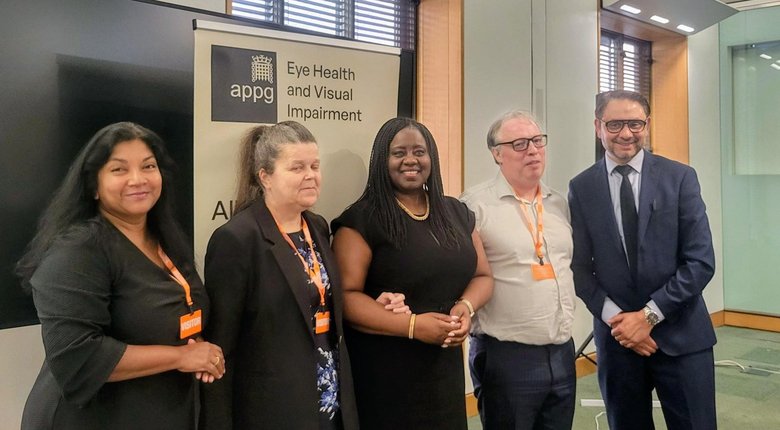The NHS 10-Year Health Plan: What do blind and partially sighted people want it to include?

Speakers at the All-Party Parliamentary Group on Eye Health and Visual Impairment meeting on the NHS 10-Year Health Plan.
In late 2024 and early 2025, a major public consultation was held to inform the shaping of a new NHS 10 Year Plan for England, due to be published this June.
As part of the consultation, RNIB ran a series of workshops with blind and partially sighted people to hear experiences, hopes, concerns and recommendations to share with the team developing the coming plan.
In our workshops, blind and partially sighted people supported the three overarching changes proposed in the Government’s consultation: of moving care closer to communities, making better use of technology, and putting a greater focus on prevention of ill health. However, our participants raised concerns about being left behind if accessibility, usability and inclusion aren't built in from the start.
Moving care closer to communities
More community-based care and virtual ward appointments could reduce the stress and difficulty of travelling to hospital. They could reduce the need to depend on unreliable and sometimes inaccessible public transport, or use of infrequent hospital transport that can mean spending long periods of time waiting at the hospital before and after appointments.
However, moving appointments closer to home, or into our homes, won’t help if we can’t actually access them, participants told us. For example, local community health centres can be closer but still difficult to get to, if they aren’t served by accessible public transport. There is also a need for good signage and wayfinding at these centres, with properly trained staff who truly understand sight loss.
Virtual wards – where someone is monitored while at home, rather than in a hospital setting – also raised concerns about accessibility for the focus group participants, both in terms of using the technology itself and the challenges of communicating remotely with care givers when you are blind or partially sighted.
Making better use of technology
When it comes to technology more broadly, people welcomed the potential for faster, simpler care. For example, improved NHS systems could make it easier for blind and partially sighted people to receive health and care information in their required alternative format, such as large print, email, audio or braille. Being able to have our communication requirements recorded once, and then actually provided across all NHS services would make a huge difference – and make our legal right to accessible health information a reality.
On the other hand, there are serious worries about accessibility and the loss of human contact if services become too automated. It is essential that we avoid a two-tier health system where disabled people face increased barriers to healthcare, which can result from technology which hasn’t been designed with accessibility in mind, or where there aren’t accessible alternatives.
For example, the touch screen self-service check-ins which increasingly appear at GP surgeries are inaccessible. There needs to be greater understanding of sight loss and the accessibility adjustments required at NHS services, such as making sure there will always be reception staff available to support patients who can’t use automated check-in technology.
Greater focus on prevention
Prioritising prevention is welcome, but again, focus group participants told us that accessibility has an important role to play. Healthy living campaigns are no good if you can’t read the information, or get safe access to gyms or exercise.
Prevention of sight loss needs to be prioritised, and can help maximise people’s independence. Prevention in eye care needs to include prevention of deterioration in eye conditions and mental health, along with support to avoid loss of employment and other forms of exclusion.
People told us they want access to individualised care, delivered by the right professional, in the right place, at the right time. The need for confidence and trust in the eye care professional delivering our care cannot be overstated. Eye care must also ensure that patients with sight loss:
- Understand their eye care journey.
- Receive clear information about their diagnosis.
- Know how to access practical and emotional support.
In addition to these workshops, RNIB convened two meetings with professionals and sight loss groups. You can read more about those discussions by downloading our summary document: NHS 10 Year Plan – Putting the patient at the centre of eye care transformation
Future-proofing the NHS for everyone
RNIB Head of Policy, Mike Wordingham, headed to Parliament on 28 April and raised the issues shared by people with sight loss at a meeting of the All Party Parliamentary Group on Eye Health and Visual Impairment.
Mike emphasised that getting the NHS 10-Year Health Plan right is about future-proofing the NHS for everyone. “It’s essential that health services are designed with us as blind and partially sighted people: not for us, but with us.”
Mike was joined by RNIB volunteer campaigner Sam Fox who is blind. Sam spoke powerfully about the barriers she has faced, such as continuing to receive health letters in standard print which she is unable to read. She called for NHS England’s Accessible Information Standard to be fully implemented across all NHS services, saying:
“For the sake of everyone who has lost their sight, please start from the beginning. Start with the basics, and think about how you communicate with us.”
Other speakers at the All-Party Parliamentary Group included the Chair Marsha De Cordova MP, Dilani Siriwardena, Vice President of the Royal College of Ophthalmologists, and Shockat Adam MP who is a practising Optometrist.
What's next?
The new NHS plan is due to be released shortly, and we’ll examine it closely to gauge how far it addresses the points raised by blind and partially sighted people.







